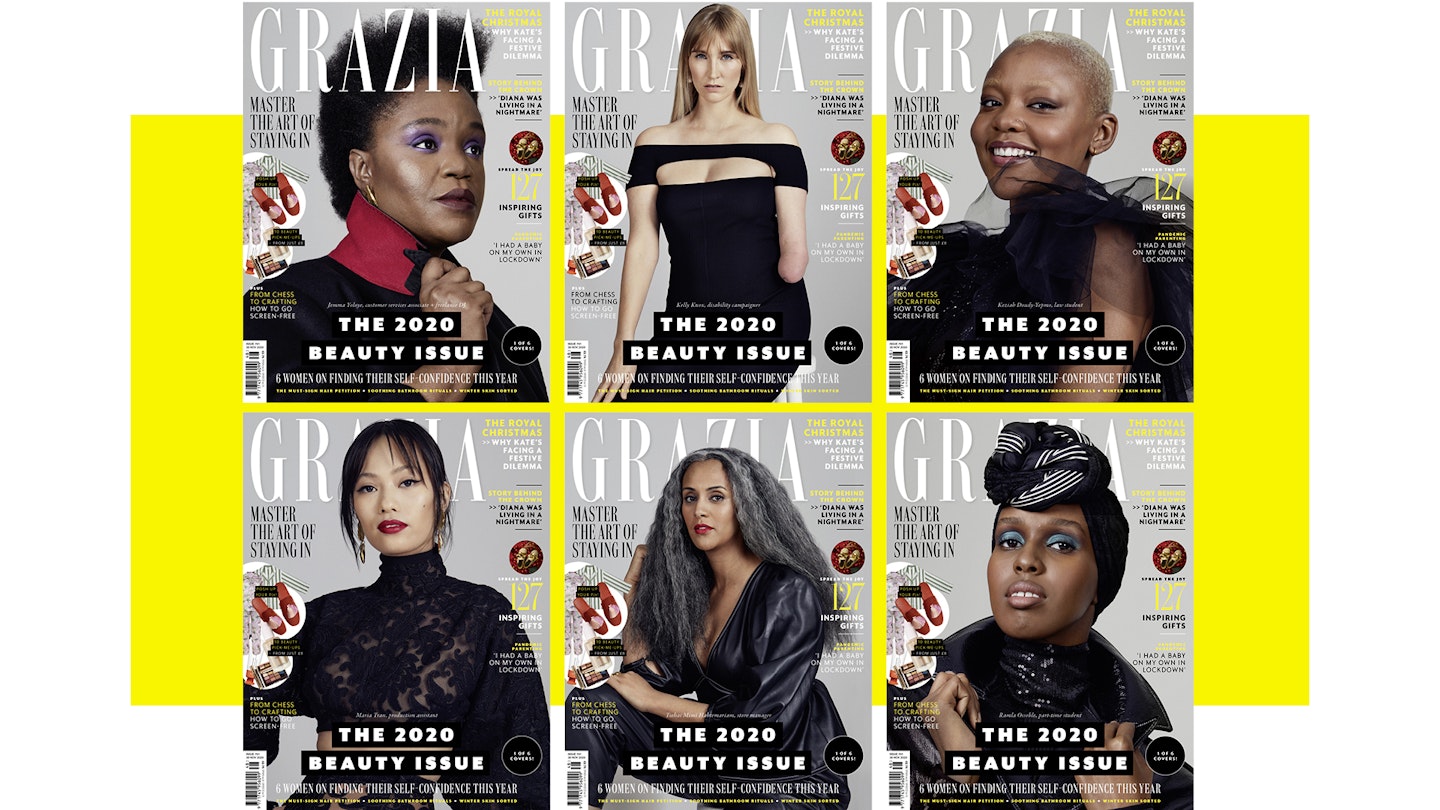Back in September, we kick-started our #GraziaOwnYourBeauty Instagram campaign by posing one pertinent question to our @GraziaUK followers: what does beauty mean to you in 2020? We were flooded with incredible responses from around the country – from people sharing their journeys of self-love and self-acceptance to others who were doing away with short-sighted societal standards and those who were simply owning their beauty like never before.
Beauty and health director Joely Walker hosted a panel of industry experts and beauty positivity advocates whose mission was to read the hundreds of captions submitted and invite six women to a socially-distanced cover shoot enabling them to tell their stories through the pages of Grazia. On the panel were award- winning hairstylist and founder of her namesake brand Charlotte Mensah (@Charlottemensah) model, writer and founder of Squish Beauty Charli Howard (@charlihoward) and make-up artist and co- founder of A.D.C Beauty, Adam De Cruz (@adamdecruz).
There’s no doubt that 2020 has been one hell of a roller coaster. But, when it comes to beauty, we feel one of our cover stars, Kelly Knox, puts it best – ‘Beauty in 2020 is imperfect, messy, raw, real, inclusive, authentic and in unity... We all shine in our unique way. Nothing more beautiful than that.’
So join us, and own your beauty...
Photographer: Billie Scheepers
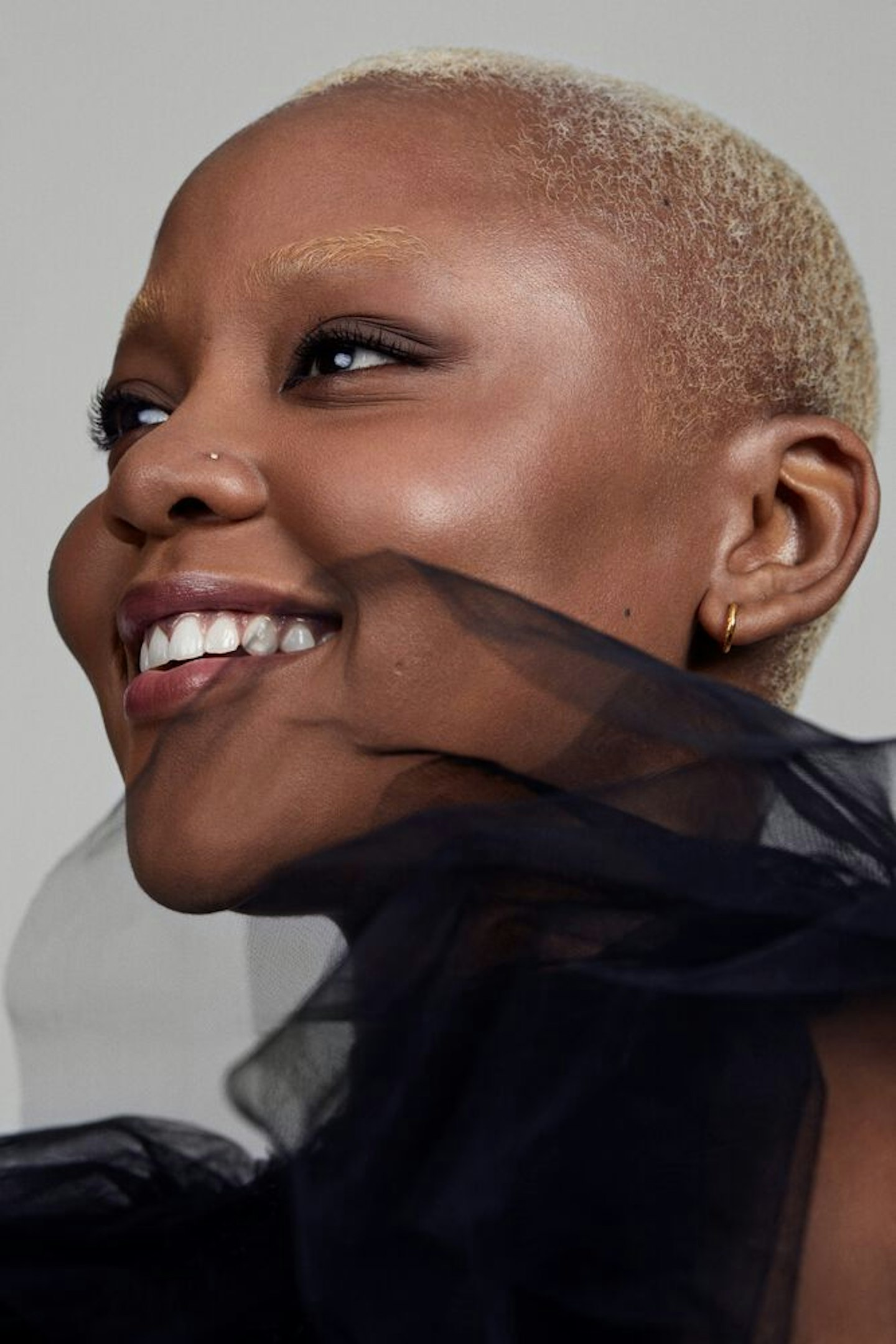
Keziah Doudy-Yepmo
Beauty doesn't look like one kind of person"
One day in March, Keziah Doudy-Yepmo decided to cut off all her hair. ‘I don’t think I’ve ever felt so comfortable with myself,’ she smiles. ‘There is literally nowhere to hide – it’s just me and my face – so I just have to own it.’
For Keziah, a 22-year-old law student, confidence has come as a result of being strict with herself. ‘A lot of it is a choice,’ she says, admitting it doesn’t necessarily feel like that when we’re ‘scrolling through Instagram and seeing what beautiful people supposedly look like’. But ‘beauty doesn’t just look like one kind of person. And if I can see beauty in people who look completely different, why shouldn’t I include me as well? You can be beautiful if you’re a Black woman who has cut her hair!’
Today, Keziah understands that beauty is an inside job. ‘These are the important things,’ she says: ‘I’m worthy of being respected, I’m worthy of love, I’m worthy of being valued, and that has no bearing on whatever my body looks like at the moment.’ She knows that the only person she needs to make her feel beautiful is herself. ‘The second you start to rely on what other people define as beautiful, that’s when it all starts to go downhill,’ she says. ‘When you feel confident and secure in yourself, it radiates positive energy. When you’re feeling yourself, people have no choice but to feel you as well.’
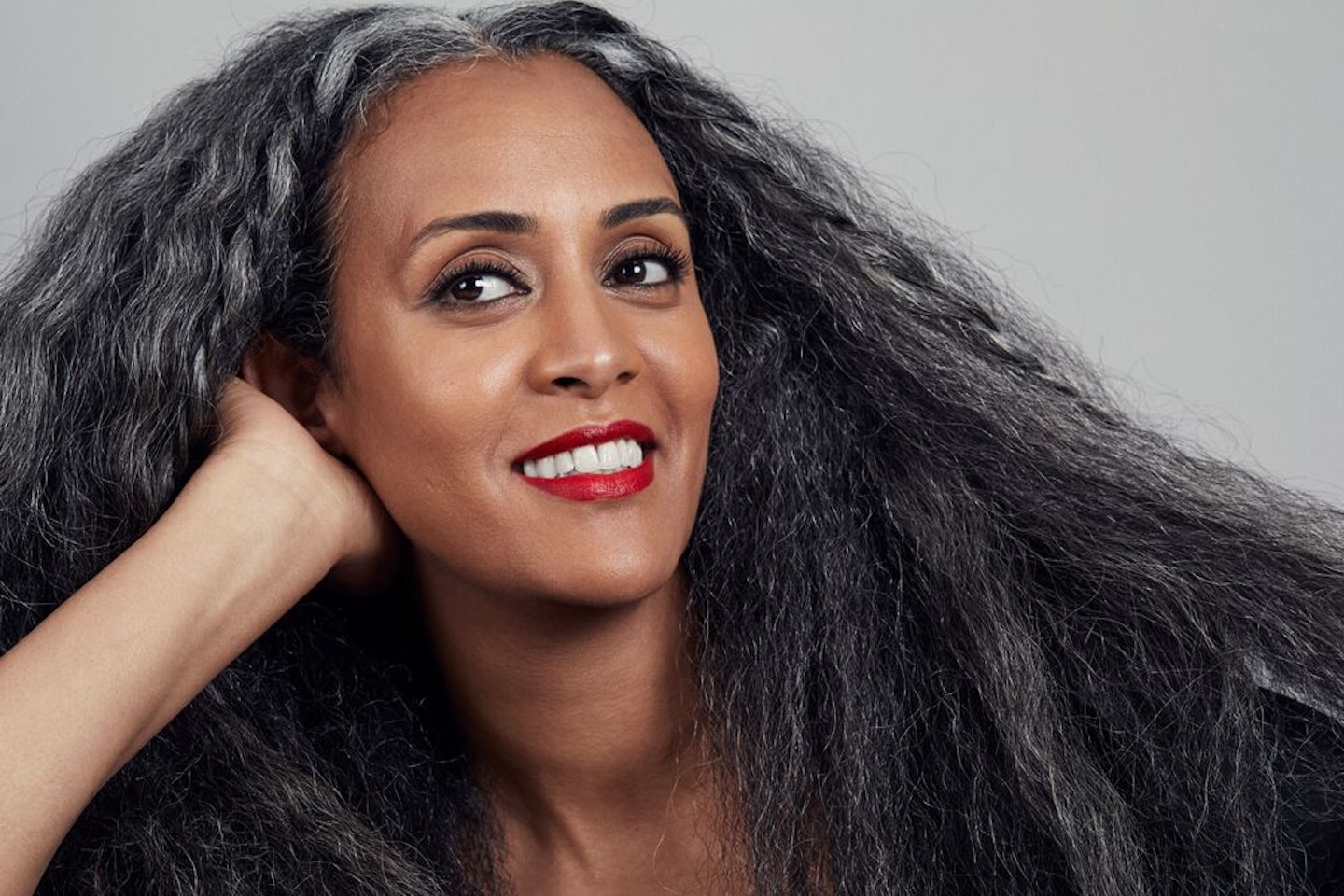
Tsehai Mimi Habtemariam
I embraced this unique, identifying feature"
Tsehai Mimi Habtemariam, known as Mimi, was 16 when she started going grey. ‘I’d always been excited by it,’ she says, adding that she never felt the urge to dye it. ‘My relationship with my hair has always been very positive.’ She wants to inspire others to embrace their ‘unique, identifying features that might not be seen as conventional’.
She doesn’t subscribe to the idea that 2020 has been a write-off. Rather, Mimi, a store manager, has used the quiet of this year to reflect on how far she’s come, how strong she is. Time with her young son has reinforced Mimi’s assertion that we are all naturally confident. ‘It feels like we’re born with this cup full of confidence – that’s what you see in children,’ she says. ‘And then it starts dripping out, bit by bit, as society pours its own expectations and criticisms [into you].’
Today, she doesn’t have patience for those criticisms. ‘If you’re confident within yourself and accept whatever “flaws” you have, then the world will be accepting,’ she says. ‘And if they’re not, who cares?!
‘I look at myself in the mirror and I feel very comfortable because I have such strong values and principles that I live by. I think that’s what you see in a person,’ she says. ‘Regardless of what you’re going through, if you have a positive attitude and are confident in yourself, it shines out of you.’
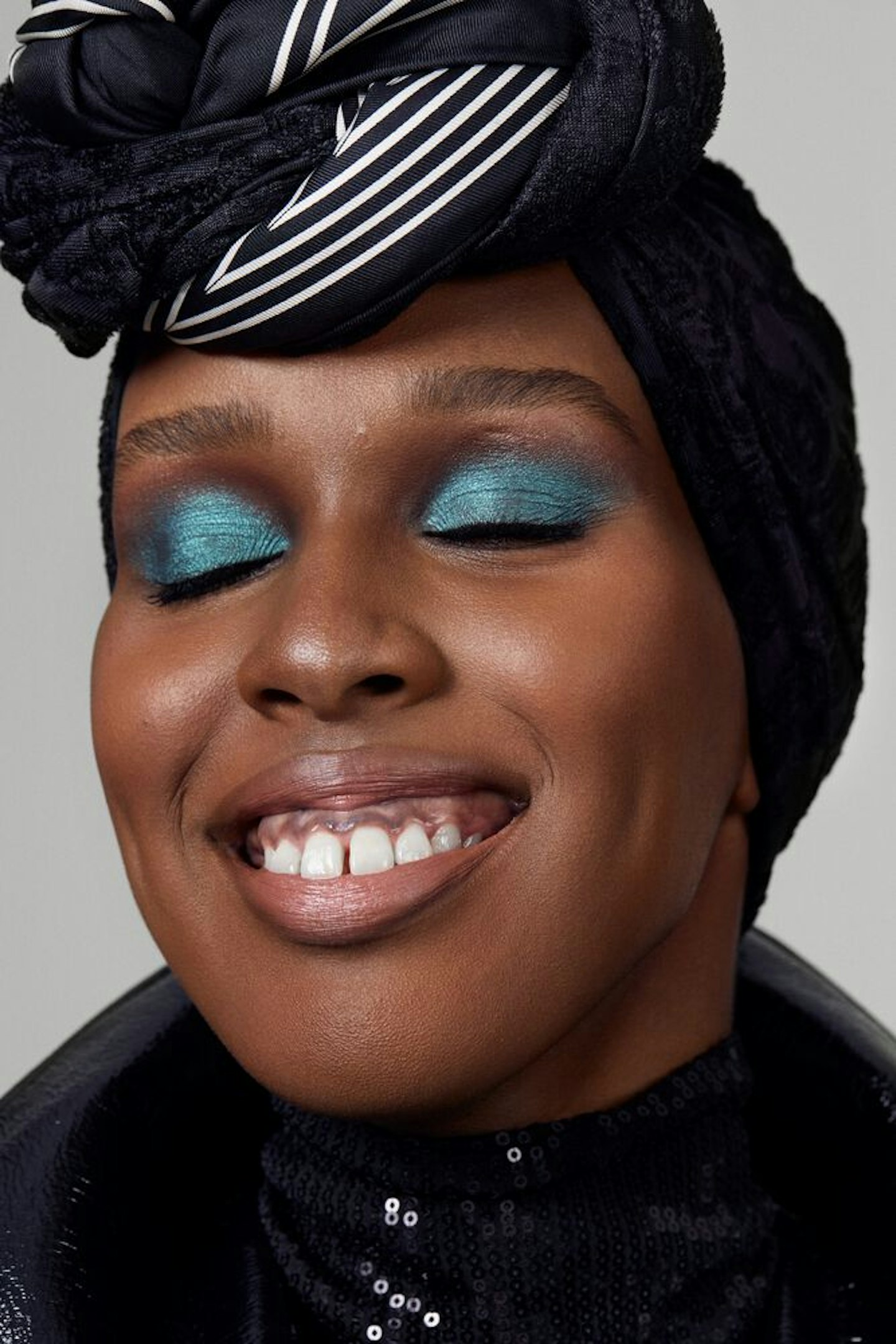
Ramla Ossoble
People make assumptions because of my hijab"
Ramla Ossoble, a part-time student and model, is on a mission to confront prejudice and ignorance wherever she encounters it. Wearing a hijab, the 21-year-old explains, ‘People just assume that I’m meek or that I don’t have my own opinions about things. That kind of mentality really upsets me.’
She gets a kick out of proving people wrong. ‘I started to make a point of trying lots of things they think aren’t accessible to us. I don’t see why a headscarf would stop me from trying things that everyone else does.’ So, when someone told her wearing a hijab meant she couldn’t do extreme sports, self-confessed ‘daredevil’ Ramla went cliff diving and scooped up a scuba certification.
She’s also been modelling for the past year. Despite being ‘100%’ happy in her own skin, the scrutiny of the work made Ramla self-critical at first. ‘It’s so easy to get caught up with having the certain lifestyle, the certain body... I’ve been trying to step away from that.’ A bout of appendicitis this summer gave Ramla a renewed appreciation of health. ‘Be grateful for every day you’re up running, walking, seeing. You should appreciate what you have and make the most of it,’ she says. ‘Owning my beauty is about not letting other people’s standards bring me down, enjoying every part of myself and accepting myself wholeheartedly.’
Ramla credits models like Halima Aden with helping to change perceptions, and she wants to be part of the increased visibility for modern Muslim women. ‘I’m hoping to show people that the hijab is not my entire identity, but at the same time it is a core part of who I am – and that part isn’t bad.’
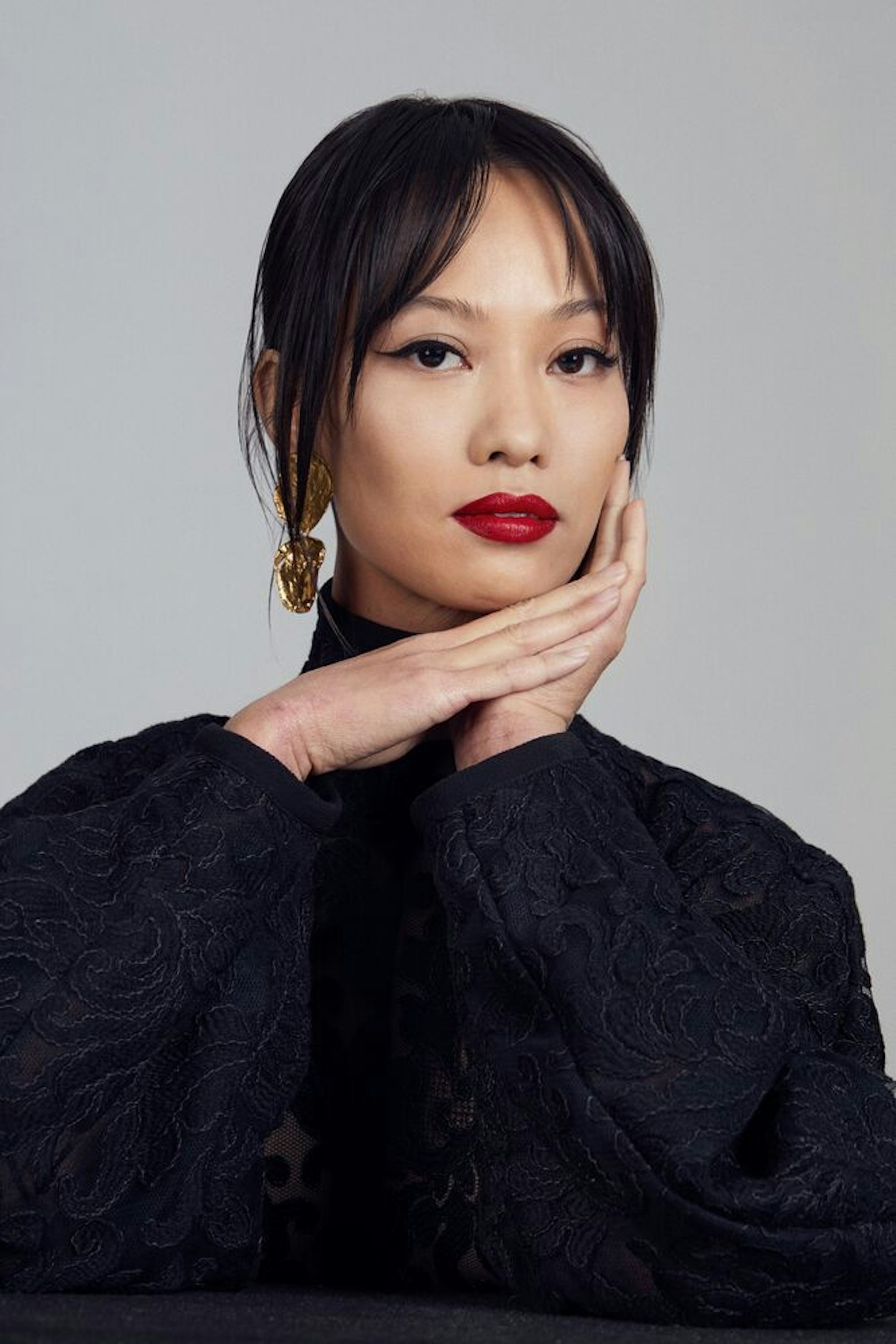
Maria Tran
Beauty is more than skin deep"
‘The “ideal” beauty is unattainable because beauty standards are constantly changing,’ says Maria Tran, 27. ‘We want all spices of life.’ Teased at primary school for the mole on her face, Maria’s journey to self- acceptance has been gradual, but no less powerful. ‘Just to be able to accept my raw self,’ is, she says, ‘a big thing.’
She wants to use this opportunity to raise awareness about eczema, which she has, and as a platform to shout about the fact that ‘beauty is more than skin deep. There’s too much emphasis on what a person looks like, their physical beauty rather than their inner beauty.’
Working in production and distribution for a make-up company, Maria loves the opportunity to express herself through fashion and beauty. But what she really finds attractive is people who can be ‘their own true self ’, something she is having fun uncovering.
What advice would she give to her younger self ? ‘First, just f*** Billy!’ she laughs, referring to one of the boys who teased her at school. ‘As cringey as it sounds, time is a healer. Everyone has hang-ups, but with age you do start to accept yourself.’
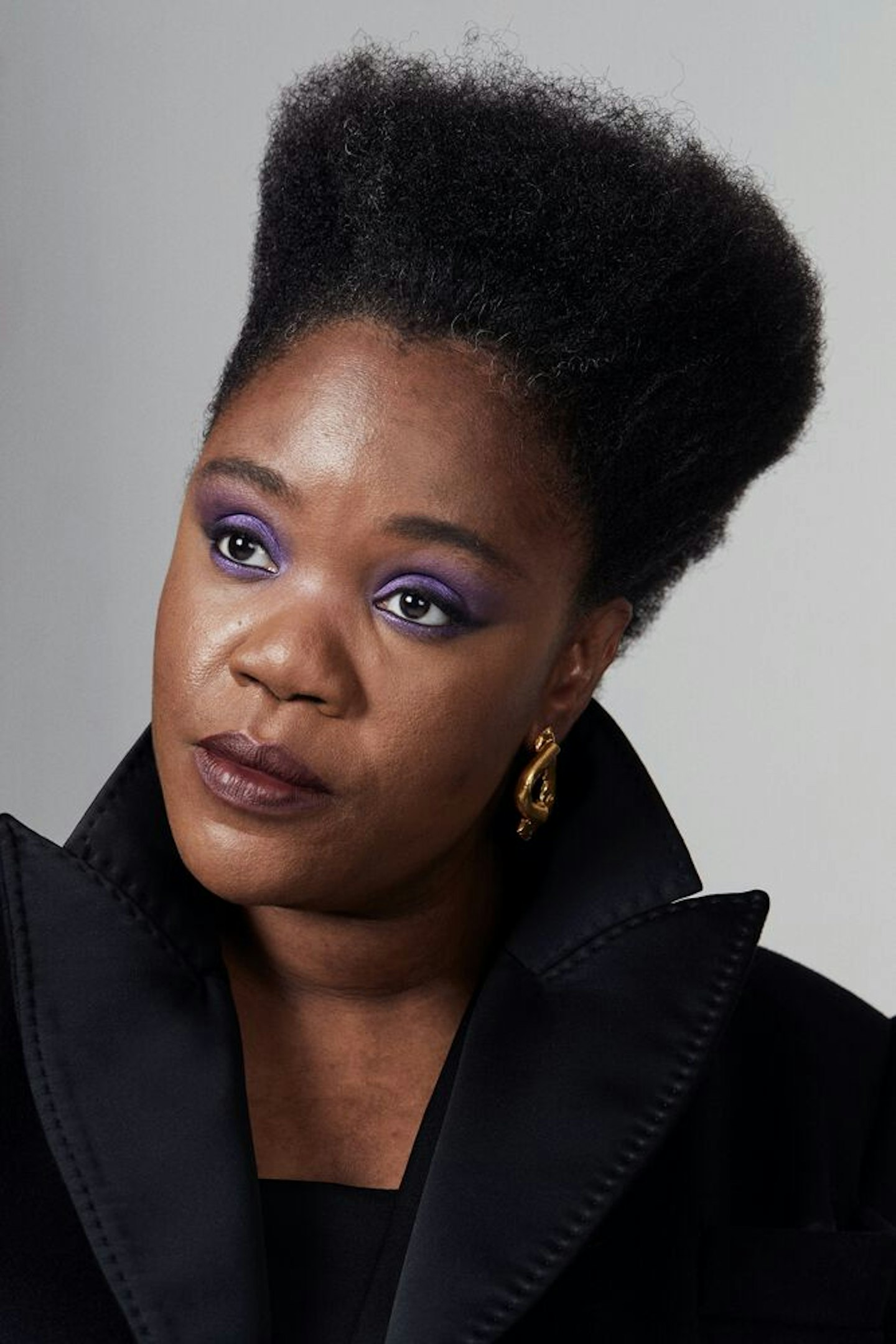
Jemma Yoloye
Every scar has a story"
For Jemma Yoloye, a customer services associate by day and a DJ by night, beauty is not about airbrushing out the pain we have endured. ‘Every single experience I’ve been through, every cut, every scar – whether it’s mental or physical – it’s made me the person that I am today,’ she says.
Jemma, 40, and her partner of 11 years had a ‘journey’ to get to their two-year-old son (she also has an 18-year-old daughter), suffering five miscarriages and a stillbirth. ‘Those kinds of experiences change you. It changed us for the better. Now that we know pregnancy is not what you see in the movies, we see each and every one of us as a miracle.’
Jemma found peace in her own body after realising that ‘seeking perfection – the perfect skin, the perfect hair, the perfect size – was making me miserable’. Life is so much bigger than that. ‘I want to travel, to meet people and, above all, be happy.’
She doesn’t buy into comparison culture. ‘I’m not going to do that thing of, “I need to be as pretty as she is.” She’s already taken; she’s her and I’m me. Own whatever it is you have. Because the minute you do, you become happier.’ Her hope for this shoot is that other women – younger Black women in particular – will look at her and realise, ‘I don’t have to alter myself to be beautiful. I can just be me.’
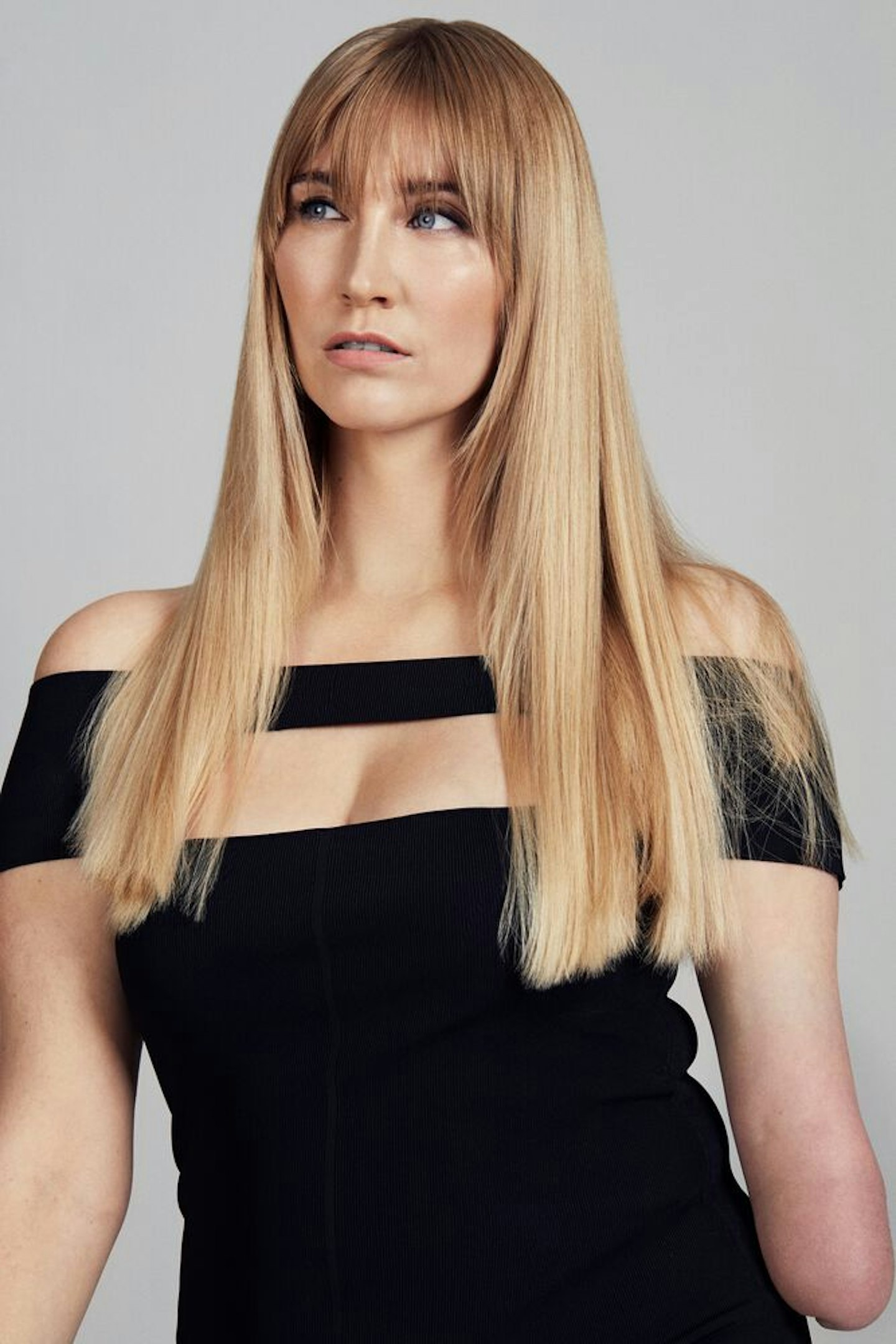
Kelly Knox
My body is clever and adaptable"
Having always felt connected to her ‘soul self ’, model and disability activist Kelly Knox, 36, has no trouble accepting her body just the way it is. ‘Do you love yourself ?’ she asks. ‘If you do, you’re indestructible.’
Born without a left forearm, Kelly adamantly refuses to let that hold her back. ‘A physical disability is so permanent that, if you don’t accept your body and love your body, then you’re screwed.’ By ‘fighting my corner’ she hopes she can help others to ‘ignite their own light too’.
She says the word ‘disabled’ is an inadequate reflection of how she feels. ‘Society has put that label on me and [in that sense] I am disabled: by negative attitudes, by society’s perception of my body, by the lack of opportunities. That’s my disability,’ she says. ‘We can enjoy fashion, enjoy beauty, we want to be involved just like everybody else.’
For Kelly, imperfections are to be embraced. ‘They’re something to celebrate, not something to hide,’ she says. Unsurprisingly, she isn’t worried about ageing. ‘It’s a bloody privilege!’ she says. ‘I hope I can be here for as long as possible to enjoy this life.’
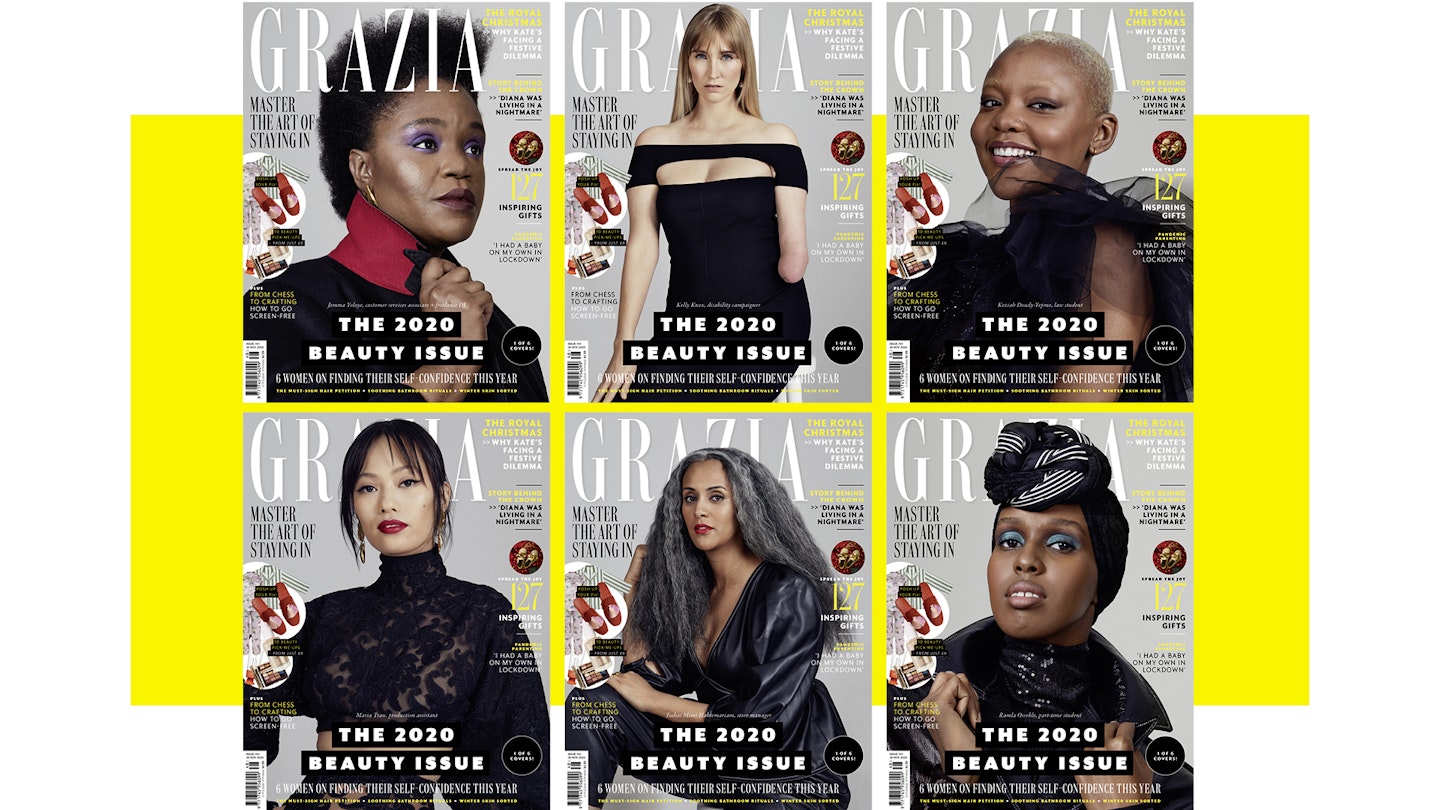
www.greatmagazines.co.uk
*Our six cover stars were chosen on the basis of an Instagram post using #GraziaOwnYourBeauty. Their views outside of that post do not reflect those of Grazia or Bauer Media.
